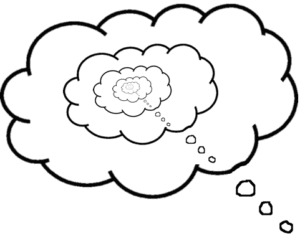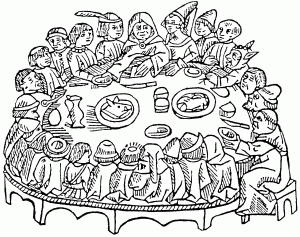Why do different cultures have different laws, norms, and values? Is it because their people or environments are different. Or does it just happen due to noise? This work looks at the variation in norms of propriety in World of Warcraft pickup raids. This seemingly frivolous system has high stakes and serious reputation problems. When we look at what communities think is “right”, we find lots of agreement within them, and huge variation between them. This is interesting because the demographics of these communities are very comparable, and their environments are literally identical (it’s a computer game). We present evidence and offer modeling ideas for how and when the mere amplification of noise can drive cultural practices in otherwise identical communities to diverge.
- In Nature Scientific Reports, with Qiankun Zhong: “Institutional similarity drives cultural similarity among online communities”
- Emergent Cultural Differences in Online Communities’ Norms of Fairness. Games and Culture In the journal of Games and Culture, work with Pontus Strimling.

How do you help people build better communities? First, you meet them where they want to do it. HeapCraft.net offers a suite of free tools for improving collaboration on Minecraft servers, while optionally contributing data to science. Collaborators include Stephan Müller (ETH), Mubbasir Kapadia (Rutgers), Robert Sumner (Disney), Barbara Solenthaler (ETH), Severin Klingler (ETH), and Richard Mann (Leeds). Foundations of Digital Games.
- Insights for communities from organizational culture: “Managing emergence” on SSRN
- Free social analytics and collaboration tools at HeapCraft.net
- Papers

What can the practice of self-governance teach us about the science of self-governance? This question has motivated my engagement with a few board positions, a member-owned business, and a TED franchise talk in Bloomington Indiana.
Youth on the Internet deserve both privacy and safety. But how do you moderate a potentially unsafe message without, you know, reading it? Merging insights from mathematical sociology, cognitive psychology, and human computationm I propose two systems for performing this impossible task. With Maarten Bos and Robert Sumner.
- Can you moderate an unreadable message? “Blind” content moderation via human computation.“
- Journal of Human Computation
Cognitive science of strategic behavior
 What makes poker experts better than amateurs, and what does it have to do with encryption? In studies of decision making, humans tend to be thought of as victims of uncertainty. But having evolved in an array of diverse and unpredictable environments, humans are just as likely to be able to use uncertainty to their advantage. Examining the behavior of expert poker players, we reveal one mechanism by which uncertainty can be used strategically to improve decision making. Using a recent multivariate approach to information theoretic data analysis, and over 1.75 million hands of online two-player No-Limit Texas Hold’em (NLHE), we find that experts are better at integrative information processing — at extracting information not just from public social signals and their own private cards, but from how those streams interact. When information streams are processed separately, outside observers can make inferences from observing partial inputs and outputs. But when outputs depend on complex contingencies between public and private inputs—when experts think hard—this reverse engineering becomes impossible. In this context, an expert poker player’s cards function as the private key in a public key cryptographic system. Though one might expect that experts must tradeoff between exploiting public signals and remaining unpredictable, the “strategic information encryption” made possible by integrative information processing permits them to “have their cake and eat it too.” By understanding uncertain strategic behavior in terms of information processing complexity, we offer a detailed account of how experts extract, process, and conceal valuable information in high-uncertainty, high-stakes competitive environments. With Paul Williams and Dominic Albino. In Cognitive Science (open version).
What makes poker experts better than amateurs, and what does it have to do with encryption? In studies of decision making, humans tend to be thought of as victims of uncertainty. But having evolved in an array of diverse and unpredictable environments, humans are just as likely to be able to use uncertainty to their advantage. Examining the behavior of expert poker players, we reveal one mechanism by which uncertainty can be used strategically to improve decision making. Using a recent multivariate approach to information theoretic data analysis, and over 1.75 million hands of online two-player No-Limit Texas Hold’em (NLHE), we find that experts are better at integrative information processing — at extracting information not just from public social signals and their own private cards, but from how those streams interact. When information streams are processed separately, outside observers can make inferences from observing partial inputs and outputs. But when outputs depend on complex contingencies between public and private inputs—when experts think hard—this reverse engineering becomes impossible. In this context, an expert poker player’s cards function as the private key in a public key cryptographic system. Though one might expect that experts must tradeoff between exploiting public signals and remaining unpredictable, the “strategic information encryption” made possible by integrative information processing permits them to “have their cake and eat it too.” By understanding uncertain strategic behavior in terms of information processing complexity, we offer a detailed account of how experts extract, process, and conceal valuable information in high-uncertainty, high-stakes competitive environments. With Paul Williams and Dominic Albino. In Cognitive Science (open version).

Is human crowd behavior driven by dumbness?
Fads, panics, crashes, and jams are all human collective behaviors, and they are all phenomena that we explain in terms of “animal-style” reasoning processes like fear, habit, reaction, and adaptation. It reflects a bias in how we think about human higher-level reasoning, which is overwhelmingly treated as something that can suppress these collective behaviors. This work shows that “what-you-think-I-think-you-think” reasoning, a uniquely human fancy reasoning process, can also drive human flocking, even when it should suppress it.
One implication is that human higher-level reasoning processes can not necessarily be relied upon for making even simple social systems more predictable. Another is that lower-level reasoning processes sometimes govern higher-level processes, instead of the other way around. Work with Rob Goldstone.

Do humans play the game you give them?
For some people, to sit down and figure one’s taxes is to enter into a strategic battle of wits with the IRS, but, for others, it is just to follow a series of logical steps, however irksome. In this and many other situations, there are dramatic differences between how we conceptualize a situation and how an economist would model it. Differences between our mental and economic models may be responsible for much of the unpredictability of society, but they have been hard to pin down in the lab. We present a human collective behavior that pops up unexpectedly in three very different lab games. That this one strange phenomenon unites these technically unrelated games suggests a “conceptual” level that lies between our cards and how we play them. This work constituted my dissertation under Rob Goldstone.

Do logic puzzles and competitive games invoke the same reasoning faculties? Not among world-class GO players. In work with Sascha Baghestanian, we pitted professional GO players against each other in a battery of classic economic games. GO is an East Asian board game that is at least as hard as chess. We found evidence in the behavior of these experts that strategic reasoning and analytic reasoning are distinguishable. Players with higher GO rankings were more likely to defect on games like the Prisoner’s Dilemma (indicating dominance of strategic reasoning) but players with higher IQs, surprisingly, were more likely to play cooperatively, even as they continued to outperform typical human populations in other tasks of sophisticated reasoning. In our analysis, GO ranking corresponds to “strategic reasoning” and IQ (actually a simple proxy for it) corresponds to non-strategic “analytic reasoning.” Journal of Behavioral and Experimental Economics.

Are there times when you should approach inanimate objects as if they were human? And conversely, are there social situations in which everyone is better off dehumanizing everyone else? When you are designing a social system you can up- and down- play the humanness of both the humans and the non-humans, and if you’re smart about it you can make the whole system work better as a result. I looked at the funny things that happen to game theory when you do and don’t strategize about things that may or may not be human reasoners. That’s important because, in our daily lives, there are many things whose agenthood depends as much on context as on their underlying nature, such as teams, infants, animals, computers, people sleeping, and sometimes even ourselves. Adaptive Behavior. Free copy.

Are literary critics right about what Shakespeare does to our minds? With modern laboratory methods, classic theories about literary experience can actually be tested. In work with Amy Cook, I reveal interactions between literary criticism and modern-day research on the dynamics of language processing. Working paper. Melody Dye, Greg Cox, and I brought some of this to the laboratory. A popular piece in Nautilus Magazine, with Jillian Hinchliffe, topped out Digg, Hacker News, and Arts & Letters Daily.

You work at a restaurant and you just took two reservations for two different parties of four. One consisted of a pair of couples, the other of four equally-unacquainted acquaintances. Which party is most likely to show up for their reservation? In other words, does pairwise coordination support, undermine, or have no effect on coordination at the scale of the group? One the one hand, coordination between two things is easer than coordination between four, so maybe the two couples will be most likely to show up. On the other hand, if the point of dinner is to have company, each member of each couple already has company and may be less motivated to go to dinner. So which is it? Though it might not look like it at first, this question is very important for “network theory,” the theory that we don’t need to study the group at full scale to understand group-scale phenomena, and that we can instead make do by studying the set of all pairs of group members. Most people think there will be a difference between the two groups. But if you believe in network theory, and your beliefs are consistent, than you should think that there is no effect. And you’ll be wrong. In experiments with Rob Goldstone, I test whether there are interactions between the different scales at which groups can coordinate. Read about it in the working paper.

Do teamwork experts deviate from practiced plays to return each other’s favors? Professional basketball is tense, competitive, and high-stakes. There are team strategies and a good reasons to stick to them. So, within that, how do players respond to favors? Robb Willer, Amanda Sharkey, and I found evidence for direct reciprocity in assists: If you assist a shot of mine, then for the next five minutes I am 10% more likely to assist you. We also looked for two other kinds of reciprocity: indirect and generalized. PLOS ONE.
An important part of engineering socially empowering technologies is engineering social systems that support them. Work with Adriano Galati and others elaborates one example in the area of international development and mobile empowerment. IEEE GHTC.
Speculative self-published abstracts. Because thinking is faster than doing, I throw up abstracts for interesting projects that I will never do. List.